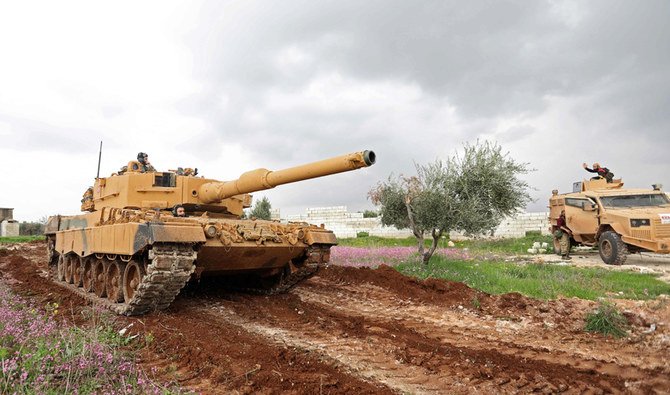
- ARAB NEWS
- 20 Apr 2024

Menekse Tokyay
ANKARA: A Turkish military base in the Syrian town of Morek is being completely demolished by Sunday evening, according to Turkish sources who said that other observation points and military sites were also due to be dismantled.
Control towers and logistical equipment inside the base are being taken down and the walls are being removed. The Syrian Arab Army, which surrounded the post from all sides, is expected to take full control of the zone that became Turkey’s weakest point against military attacks.
Turkey’s presence in northwestern Syria has come under increasing pressure since mid-September, with a Turkish Red Crescent worker being killed and two others injured. Afrin Liberation Forces also targeted a Turkish observation point in the Al-Ghazawiyah area of Afrin city, northwestern Aleppo, in mid-September.
Attacks on a joint Russian-Turkish patrol on the international M4 highway that injured Russian soldiers have also been a source of concern.
Turkish forces are alleged to have been transferred from Morek to the Jabal Al-Zawiya region of neighboring Idlib governorate.
Ankara has yet to officially confirm its withdrawal. But Russian state-owned news agency Sputnik reported that Turkey had notified Russia of its withdrawal decision from the region.
The Turkish military still has more than 50 observation posts across northern Syria, creating a serious source of tension with Damascus because Ankara was only allowed to open 12 posts to the north and east of Idlib, according to the 2018 Sochi agreement.
Eight of these observation posts and five fortified positions are currently under siege by Syrian forces.
Navvar Saban, a military analyst at the Omran Center for Strategic Studies in Istanbul, said that Turkey did not want to take any risks in case of a military operation.
“As some Turkish observation points are besieged right now, Turkey has the lower hand that might affect negotiation terms,” he told Arab News. “The Russians will have the upper hand because they control the fate of these besieged points.”
Saban said that Turkey was planning to pull out from all of these points and redirect them to an area south of the M4.
Moscow has tried to convince Ankara to reduce its military presence in Idlib and remove some of its observation posts in the area.
But Turkish government officials have indicated that a withdrawal is out of the question because a regional presence is a bargaining chip in negotiations with Damascus and Moscow. On the other hand, holding Idlib under control is of key importance for Turkey to prevent any refugee wave toward its borders.
How Turkey will proceed against rising security threats against its military deployment in the area is a big question. A war in Idlib might be on the horizon in light of a recent military build-up by Turkey to Idlib’s south.
Aydin Sezer, an expert on Turkey-Russia relations, said the Turkish military was getting ready for any upcoming military clashes in the region.
“Tensions between Turkey and Russia have escalated recently, especially after the engagement of both countries in the conflict between Armenia and Azerbaijan where the Kremlin criticized Ankara for pushing a military solution to the Nagorno-Karabakh conflict,” he told Arab News.
According to a March agreement between Turkey and Russia, Turkey pledged to wipe out terror zones in and around Idlib in six months.
“This withdrawal might have been triggered by Russian pressure on Turkey considering the local dynamics in Turkey,” Sezer added. “Russian military police were trying to protect some observation points which were already under the siege of (President Bashar) Assad’s troops to prevent any direct clash. The latest disagreements in the South Caucasus have also stimulated Russia in putting the Idlib issue on the top on its agenda.”
But he thought that Turkey could not sustain a long-term presence in the south of the M4 because Russia expected total security along the highway to open it for road traffic, while a Turkish presence would introduce a source of tension with Assad forces.
Dr. Emre Ersen, an expert on Turkey-Russia relations from Marmara University in Istanbul, said the agreement reached between Turkey and Russia regarding the Idlib crisis in March was a temporary solution to prevent a possible military clash between Turkish forces and the Assad regime.
“Yet the COVID-19 outbreak, which became an urgent issue around the same period, forced both governments to focus on their domestic problems,” he told Arab News. “Now, it seems that Russia is gradually returning to its pre-pandemic agenda in foreign policy and this is probably why it has been exerting more pressure on Ankara to withdraw from some of the military observation posts in Idlib.”
But Ersen added that the timing of the pressure was interesting, especially considering the growing rift between Ankara and Moscow about other conflicts such as Nagorno-Karabakh and Libya.
“In this sense, Moscow will probably try to use the Idlib issue as part of a greater bargain with Ankara which also includes the settlement of other disputes in the Caucasus and the Middle East.”